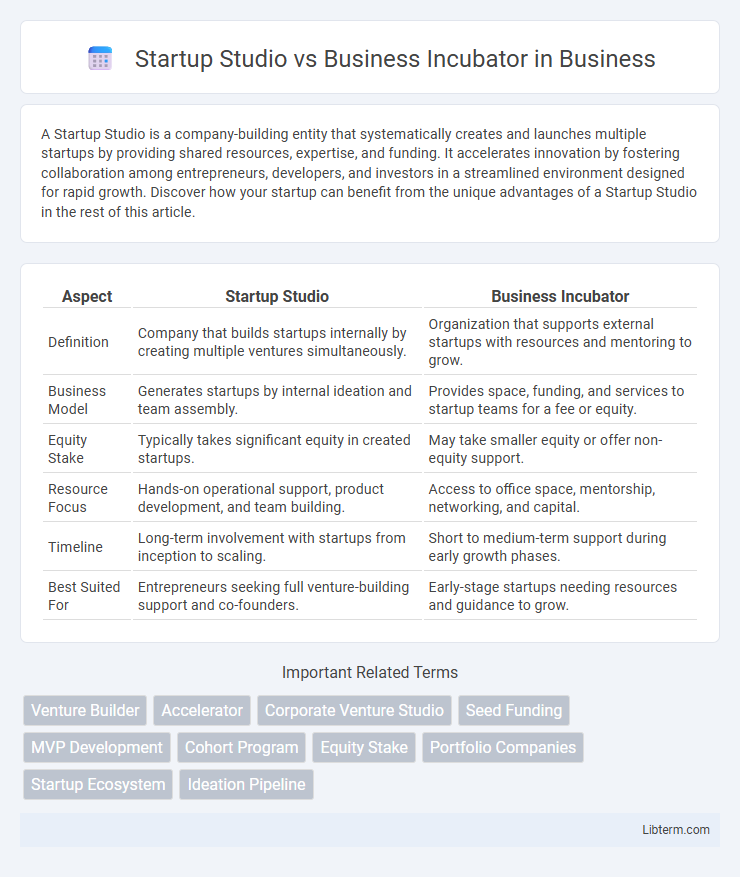A Startup Studio is a company-building entity that systematically creates and launches multiple startups by providing shared resources, expertise, and funding. It accelerates innovation by fostering collaboration among entrepreneurs, developers, and investors in a streamlined environment designed for rapid growth. Discover how your startup can benefit from the unique advantages of a Startup Studio in the rest of this article.
Table of Comparison
| Aspect | Startup Studio | Business Incubator |
|---|---|---|
| Definition | Company that builds startups internally by creating multiple ventures simultaneously. | Organization that supports external startups with resources and mentoring to grow. |
| Business Model | Generates startups by internal ideation and team assembly. | Provides space, funding, and services to startup teams for a fee or equity. |
| Equity Stake | Typically takes significant equity in created startups. | May take smaller equity or offer non-equity support. |
| Resource Focus | Hands-on operational support, product development, and team building. | Access to office space, mentorship, networking, and capital. |
| Timeline | Long-term involvement with startups from inception to scaling. | Short to medium-term support during early growth phases. |
| Best Suited For | Entrepreneurs seeking full venture-building support and co-founders. | Early-stage startups needing resources and guidance to grow. |
Understanding Startup Studios and Business Incubators
Startup studios are organizations that co-found startups by providing initial ideas, development resources, and funding, aiming to build multiple companies simultaneously from within a centralized team. Business incubators offer external support to early-stage companies, including office space, mentorship, and access to investors, but typically do not create startups themselves. The key distinction lies in startup studios actively generating and managing startups internally, while business incubators facilitate growth for independently founded startups.
Key Differences Between Startup Studios and Incubators
Startup studios create multiple startups simultaneously by providing full operational support, equity, and management from inception, while business incubators offer resources like office space, mentorship, and networking mainly to early-stage startups seeking growth. Startup studios maintain a hands-on role in building startups' core teams and products, whereas incubators focus on nurturing external entrepreneurs through structured programs. Funding models also differ: studios invest capital directly into ventures they co-found, whereas incubators typically facilitate external funding opportunities for incubated startups.
How Startup Studios Operate
Startup studios operate by systematically creating multiple startups in-house, leveraging shared resources, dedicated teams, and a repeatable process for ideation, development, and scaling. They prioritize founder involvement, equity ownership, and operational support from inception, differentiating from business incubators that primarily provide mentorship, coworking spaces, and external support to independent startups. This model accelerates time-to-market and enhances startup success rates by integrating idea validation, product development, and business growth within a centralized framework.
How Business Incubators Work
Business incubators provide startups with essential resources such as office space, mentoring, and access to funding networks to accelerate growth during early stages. These programs often involve structured support services including business development guidance, networking opportunities, and technical assistance tailored to industry-specific needs. By fostering a collaborative environment, incubators reduce operational risks and increase the likelihood of startup success through sustained mentorship and resource allocation.
Funding Models: Studio vs Incubator
Startup studios typically provide internal funding by building multiple startups in-house, leveraging shared resources and equity stakes to optimize capital efficiency. Business incubators primarily offer external funding sources, connecting startups with angel investors, venture capitalists, and grant opportunities while supporting early-stage development through mentorship and infrastructure. The studio's equity-centric model contrasts with incubators' broader funding ecosystem, making each suitable for different startup growth strategies.
Startup Support: Resources and Services
Startup studios provide hands-on support by co-founding startups, offering shared resources such as development teams, marketing, and operational expertise, which accelerates product development and market entry. Business incubators primarily offer mentorship, office space, networking opportunities, and access to funding, focusing on nurturing early-stage startups through guidance and infrastructure. Both models enhance startup growth, but startup studios are more involved in day-to-day operations, while incubators emphasize external support and ecosystem connections.
Success Rates and Outcomes Comparison
Startup studios typically achieve higher success rates than business incubators due to their hands-on approach in building multiple startups simultaneously with shared resources and expert teams. Business incubators provide essential support such as mentoring, office space, and networking but often see varied outcomes since startups retain more independence and face steeper hurdles in scaling. Studies show startup studios report faster product development cycles and higher funding acquisition rates, resulting in greater long-term sustainability compared to the broader, less intensive incubation model.
Ideal Candidates for Startup Studios
Startup studios are ideal for experienced entrepreneurs and teams with technical skills seeking comprehensive support in building multiple startups simultaneously, benefiting from shared resources and in-house expertise. Unlike business incubators that mainly provide mentorship and basic resources to early-stage founders, startup studios actively co-create, co-found, and invest in startups from ideation to scaling. Candidates thriving in startup studios are those eager to deeply engage in product development, iterative testing, and rapid market validation within a structured, resource-rich environment.
Who Benefits Most from Business Incubators
Business incubators primarily benefit early-stage entrepreneurs and startups seeking tailored mentorship, affordable office space, and access to a network of investors and industry experts. These programs support companies that require hands-on guidance for refining their business models and navigating initial market challenges. Entrepreneurs in fields such as technology, healthcare, and social innovation gain significant advantages from incubators' structured resources designed to accelerate growth and sustainability.
Choosing the Right Path: Studio or Incubator
Selecting between a startup studio and a business incubator depends on the level of involvement and resources needed; startup studios provide hands-on support, co-founding startups and offering dedicated teams, while business incubators primarily offer mentorship, networking, and office space. Entrepreneurs seeking a more collaborative, idea-to-launch environment benefit from startup studios, whereas those with independent ideas looking for guidance prefer incubators. Evaluating factors such as equity stakes, operational roles, and strategic goals is critical to choosing the optimal path for business growth.
Startup Studio Infographic

 libterm.com
libterm.com